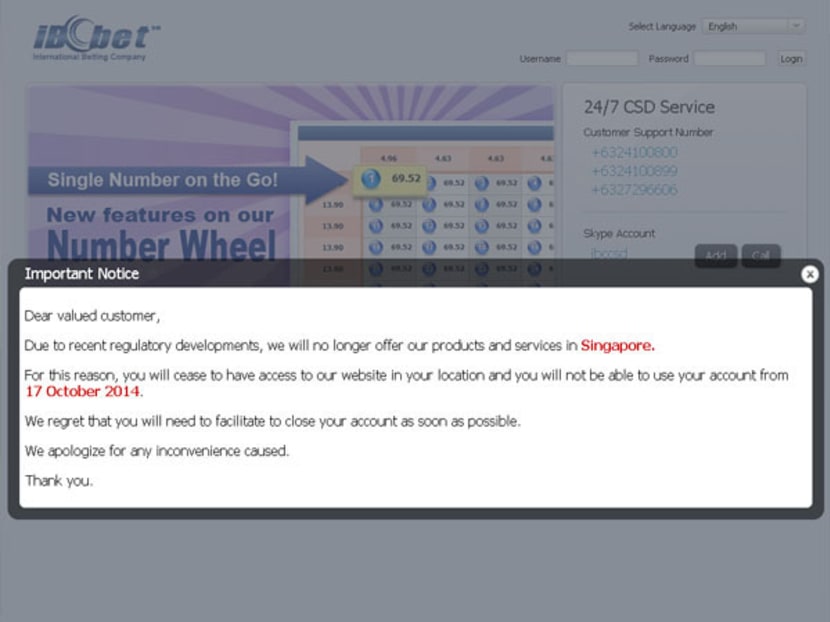Online gaming firms start shutting S’pore accounts

A screengrab of a pop-up message on iBCbet's homepage saying it will no longer offer its services to Singapore.
SINGAPORE — Barely a week after the proposed law to ban remote gambling was passed, several online gaming operators have moved to sever links with their Singapore-registered customers.
Although the new law will only take effect next year, at least two operators have informed users here their accounts will be shut down this week, while two other operators have stopped registering new accounts from Singapore.
Bet365 has told its Singapore customers that their accounts will be closed today and has asked that funds be withdrawn from the accounts.
“We regret to inform you that we are no longer able to provide services to accounts registered in your country,” its notice to users stated.
IBC Bet will block access to its website from Singapore starting on Friday and has asked its customers here to close their accounts as soon as possible. “Due to recent regulatory developments, we will no longer offer our products and services in Singapore,” a pop-up notice on its website stated.
Online gambling operators that are not accepting new account holders from Singapore include 888 and SBOBET. Singapore is no longer in the drop-down list of countries on SBOBET’s sign-up page, while 888 does not allow Singapore gamers to create an account, displaying the message “your country no longer allows its residents to play our games online”.
The Remote Gambling Act, which was passed in Parliament last Tuesday, criminalises the entire spectrum of remote gambling. Parties outside Singapore — many major operators are registered in places such as Gibraltar, the Isle of Man and Cagayan Special Economic Zone — that provide remote gambling services to people here face fines of S$20,000 to S$500,000 and up to seven years in jail. Internet Service Providers may also be issued orders to block access to various sites by the authorities.
However, operators may apply for exemption, provided they are Singapore-based and not-for-profit.
The premature move by online gaming operators did not surprise lawyer Matt Pollins of international technology, telecoms and media law firm Olswang Asia.
Most reputable international gambling operators have a clear policy not to take bets from countries where it is illegal to make or accept bets, he said. Many operators would also prefer not to invest time and resources to build relationships with users for whom they would need to cease operations within months, said Mr Pollins.
“It is an administrative and compliance issue that they would prefer to deal with sooner rather than later.”
Mr Lau Kok Keng, head of intellectual property, sports and gaming at law firm Rajah & Tann, called the step a “good business risk management” on the operators’ part.
Online gaming operators that operate in Singapore or have a presence and customer base here now realise that their time is up, he added.
Other major operators are monitoring the developments for now. Bookmaker William Hill told TODAY it would cease all services to Singapore residents once the new law takes effect, while poker room PokerStars said there are no plans to make any immediate changes to its service as it tracks local developments. It will inform players of changes that will affect them directly and the players’ funds will be made accessible for withdrawal, the operator added.
Mr William Mummery, executive director of Celton Manx Limited, which operates SBOBET, told TODAY that his company would take all the steps necessary to comply with the new law when its implementation date is known, despite the view that the lawmakers may not have fully considered its widespread implications and the “far-reaching effects it may have on legitimate businesses and individuals”.
Lawyers said the law may also affect operators that do not deliberately target Singapore users and businesses that provide core and critical services to remote gambling operators. Overseas services that do not “geo-block” Singapore might need to take extra steps to comply with the new law, for example, to avoid inadvertently committing a crime, said Mr Pollins.
Many software developers who license gaming software and provide maintenance and support services to remote gambling operators have a physical business presence in Singapore, said Mr Lau.
“Their case is less clear-cut and they will need to consider if they, too, may run afoul of the Act.”






